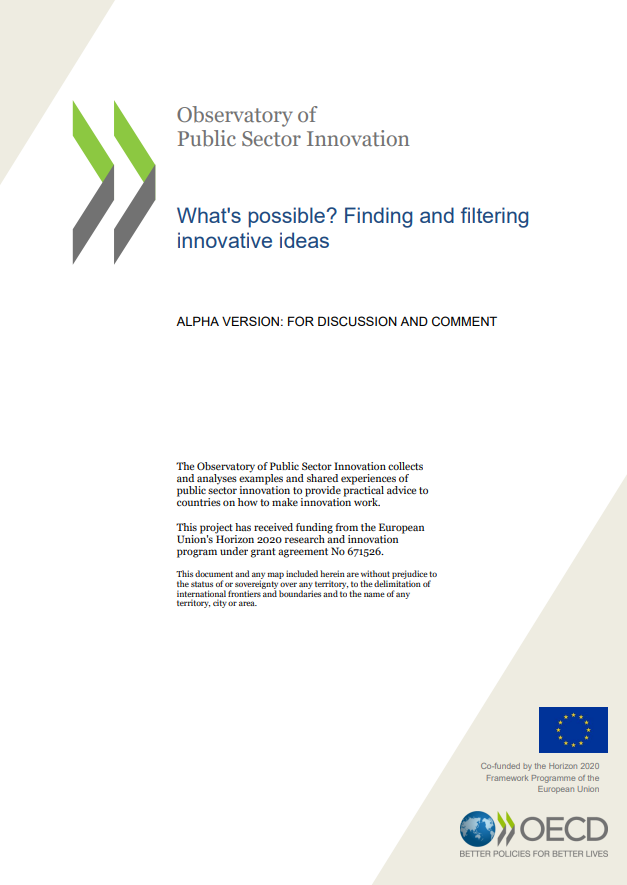What’s Possible? Finding and Filtering Ideas (Innovation Lifecycle 2/6)

Summary
For a range of reasons, public sector organisations need to become more sophisticated at innovation – the implementation of novel ideas that have an impact. This report is the second of a series of studies being conducted by the OECD with the support of the European Commission to look at the fundamentals of the innovation lifecycle. The aim of these studies is to understand what helps or hinders at the different stages of the innovation process, and how and when different innovation tools can be useful, and under what conditions.
This study looks at the second stage of the innovation lifecycle – how to generate ideas.
Idea generation
In the innovation process, ideas are alternative possibilities of how things might be. Idea generation is a structured process for both finding (comping up with or sourcing from elsewhere) and filtering (screening and prioritising) ideas. It can be a large process involving people from multiple countries, or it can be something that is done quickly by one person at their desk with a scrap of paper.
Idea generation may often be a quick process, but that only makes it more important to understand what is involved in effective finding and filtering of ideas. Idea generation matters because it will affect the rest of the innovation process. An innovation process that acts on the wrong sorts of ideas will be one that will have difficulty in successfully making things better.
A changed context
One of the longstanding roles of the public sector has been coming up with new ideas and mediating between different possibilities of what could be done. However the context for the public sector has changed, and governments need to be both faster and more collaborative in their consideration of ideas. Idea generation is now often much more open, involving more people and perspectives, and governments are often confronted with a multitude of ideas rather than a shortfall.
Effective finding and filtering of ideas
There are a number of aspects to the core process of finding and filtering ideas including appreciating the appetite for ideas, understanding that different problems require different sorts of ideas, having criteria for filtering ideas, and ensuring that the idea generation effort is a repeatable process. The report outlines some of the core consideration in finding and filtering ideas for problems that require a novel response by the public sector.
Enabling effective finding and filtering of ideas
How does an organisation support the effective finding and filtering of ideas? There are number of aspects identified, including factors such as confronting the status quo, leadership, having a clear sense of the problem, having involved decision makers, legitimacy, political engagement and diversity. This report suggests that these aspects can be grouped into three broad categories – innovation maturity, respect for systems, and respect for system players. While no idea generation process will likely address all aspects equally, knowledge of each can help ensure that the process does not overlook anything.
Contributors and channels for ideas
While ideas can come from anywhere (and anybody), a number of categories of contributors are suggested as well as some likely channels by which their ideas or perspectives will reach an organisation. This may assist organisations to reflect on who ideas are coming from, how, and what that might signify about existing idea generation, and where additional focus might be needed, including through the use of supplementary tools or methods.
Tools for ideas
There are many tools available to help with finding new ideas, and some of these tools also assist with the filtering of ideas. Yet which tools are most useful for which aspects of idea generation? This report examines a number of tools and considers their contribution for the following criteria:
- Help foster legitimacy
- Challenge assumptions and better define the problem
- Provide new insight into what’s possible (including existing solutions)
- Identify and build on ideas (including filtering out poor ideas)
- Provide insight into how ideas may play out
- Contribute to support and ownership of ideas
A work in progress
This report, as an alpha version, is a work in progress. It is intended that the report will be refined in response to feedback, before being released as a beta version, and then a final. Feedback is welcomed.

What’s Possible? Finding and Filtering Ideas
Published on 1 March 2017.
